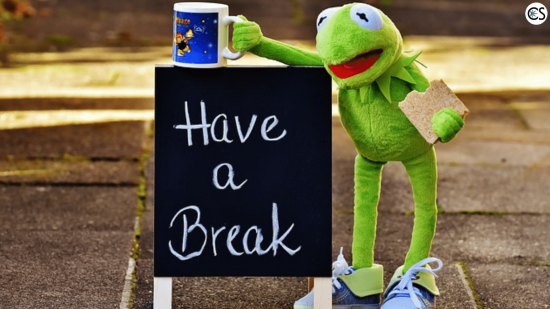A Cannabis tolerance break, or THC tolerance break, is also called a “t-break” because of the THC content. A cannabis tolerance break can be a much-needed part of your routine when it comes to cannabis consumption. Whether you’re one of those chronic daily cannabis smokers like Snoop Dogg or simply take a few tokes a day, there comes a time in most cannabis consumers’ lives where a cannabis tolerance break is in order for peace of mind and mental health.
THC Tolerance Break
If you are a person who consumes cannabis regularly, let’s be real. After smoking weed day in and day out, you’ve likely experienced a bit of burnout and may need a cannabis tolerance break.
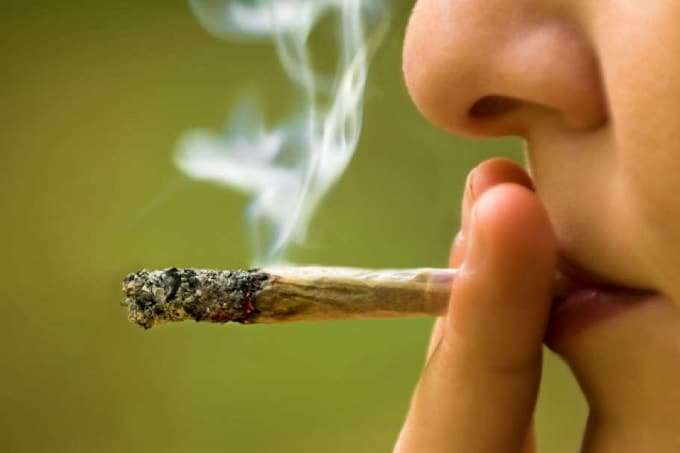
We’re not going to lie, we’ve been there ourselves. This is exactly why we’re firm believers in taking a cannabis tolerance break (or being cannabis abstinence) from time to time.
What exactly is a cannabis tolerance break from THC? And why is taking cannabis tolerance break important?
As always it is best to talk to a doctor before adding any new supplement into your daily routine or as a medicine for chronic pain. They will provide medical advice on the adverse health effects associated with cannabis withdrawal symptoms or if taking cannabis will affect any current medical conditions.
What is a T break?
A THC (cannabis) tolerance break is just what it sounds like. It’s the deliberate practice for chronic users to take a break from THC cannabis products (marijuana use) to clear the body and mind from the effects of the psychoactive cannabinoid.
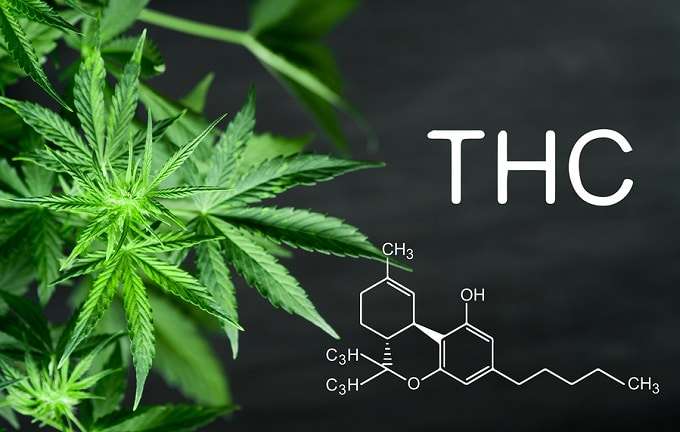
Medical cannabis users take t-breaks when their usage of cannabis is providing diminishing returns. What this means is that their cannabis use is no longer providing them with the positive effects it was in the past due to a high tolerance or regular consumption patterns.
The same thing can happen to non-medical cannabis users as well.
Is this because regular cannabis consumers actually build up a high cannabis tolerance to the effects of herb Research says yes—but as always, the devil is in the details and a t-break is needed.
What is Tolerance to Any Substance?
Let’s take a deeper look at how a true t-break from cannabis consumption habits can provide health benefits in the long run.
First, we need to properly define some terms to make the discussion easier to understand.
What is the Difference(s) between tolerance, addiction and dependence?
- Tolerance can be defined as a state where higher or more frequent use of a substance is required to achieve the initial or desired effect. Another definition, more clinical, of tolerance is “A state of adaptation in which exposure to a drug induces changes that result in a diminution of one or more of the drug’s effects over time”1
- There are essentially two forms of tolerance: Behavioral (or psychological) and physical.
- There are essentially two forms of tolerance: Behavioral (or psychological) and physical.
- Addiction is characterized by craving and one or more of the following behaviors:
- Lack of control overuse
- Compulsive use despite evidence of harm
- Dependence can be either physical or psychological.
- Physical dependence is a biological adaptation to chronic drug use and is manifested in withdrawal signs and symptoms.
- Psychological dependence is an emotional need for a drug resulting in pleasurable effects.
- Physical dependence is a biological adaptation to chronic drug use and is manifested in withdrawal signs and symptoms.
Tolerance does NOT necessarily imply either addiction or dependence, but there is a good deal of overlap in all three states.
What is THC tolerance?
A 1995 article published in High Times, Marijuana and the Brain, Part II: The Tolerance Factor, highlighted a 1993 study that looked at chronic cannabinoid administration in rats.

Six different groups of the lab animals were given either CBD, THC, synthetic cannabinoids, or a placebo, where changes in behavioral responses were then compared with changes of density in six various areas of the brain.
According to the article, the THC doses given to the rats were some ten times greater than what a “heavy human marijuana smoker would consume in a day.” Keep in mind, the study was conducted in 1993…a time when weed didn’t even come close to as strong as it is today. Regardless, the study found what many cannabis smokers already know.
Their research shows, “The result [of the study published] has implications for the consequences of chronic high levels of drug use in humans, suggesting diminishing effects with greater levels of consumption.”
It was discovered that the body adapts to the ingestion of large amounts of THC by reducing the number of cannabinoid receptors (like CB1 receptors) available in the body. This reduces the effects of the psychoactive cannabinoids overtime on these receptors.
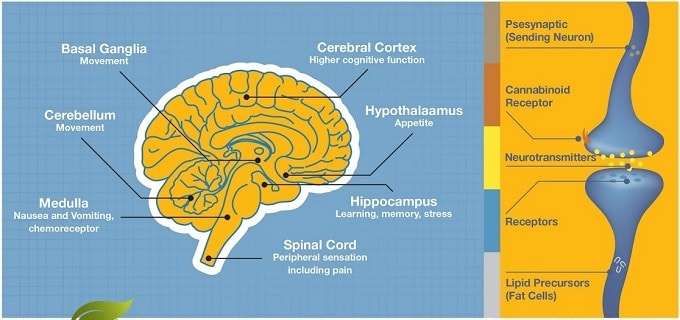
As a heavy consumer’s body adapts to these changes in the endocannabinoid system, they won’t continue to feel the same results of cannabis. Basically, the more cannabis you smoke, the less high you get. The tolerance to cannabis is lessened.
Welcome to the number one reason why many heavy marijuana consumers choose to take a tolerance break. More recent studies have indicated that the question is not so simple.
For example, a recent review concluded that in general, the use of cannabis over a long period of time reduces the effects from previous levels with each new experience feeling a bit lower than the previous.
Pretty much in the same way alcohol works with a person’s system.
But there are differences in what is affected and how—cognitive processes, for example, are more affected than are the effects on the cardiovascular system and psychological tolerance is variable2.
But, to get real, though—if you smoke weed regularly, you know that chronic cannabis consumption can put a serious dent in your drive.
Experiencing Burnout or Diminishing Returns With Too Much THC
Burnout is real, especially amongst those who are heavy consumers of cannabis. Think you can’t become dependent on cannabis?
Think again.
We’re not talking about being addicted to marijuana as one might be to another drug like heroin or cocaine or even prescription medicine.
A dependency on cannabis is usually different than the extremes people imagine when it comes to an addiction to drugs.

We’re talking dependency, which has shown to be most common in adults that average 10 years or more of almost daily use that have made serious attempts to quit at least six times.
The technical name for this is Cannabis Use Disorder (CUD). It does not appear to cause permanent adverse effects—for the most part, recovery means abstinence.
Though it does seem to be dependent on a number of factors including the age when someone starts using cannabis (the younger you are the more permanent the effects appear to be), how much you use and the ratio of THC to CBD in the cannabis used3.
According to a 2007 review, individuals who’ve become dependent on cannabis may continue to smoke daily despite experiencing the following4:
- Social, psychological, and physical impairments
- Relationship and family problems
- Guilt associated with using cannabis
- Financial difficulties
- Low energy and self-esteem
- Dissatisfaction with low productivity levels
- Sleep and memory problems
- Low life satisfaction
If any of these sound familiar, it could be time to take a cannabis tolerance break.
Note: a tolerance break from THC is for a person who is not addicted to cannabis but just needs tolerance breaks—true addiction is relatively rare. If you or your loved one are struggling with addiction to cannabis, consider seeking professional help as you may need more than just tolerance breaks.
THC Consumption and Dopamine
Here’s something else to consider when possibly considering a break. Research indicates that there is a reduction in dopamine levels where excessive cannabis use is concerned.
What is dopamine responsible for, exactly? Dopamine is a prominent neurotransmitter—it carries messages between brain cells. Dopamine plays a major role in regulating behavior, mood, sleep, and cognition. It’s also associated with reward and motivation, as well as creativity and decision-making5.

A 2017 study found that heavy users of cannabis produced significantly lower levels of dopamine than light users or those that don’t use at all6.
What exactly does this have to do with taking a break from cannabis? You know that burnout feeling that comes with smoking weed all day every day? Well, dopamine may play a big role in that.
Dopamine appears to regulate ambition and/or motivation, that is, how much effort is needed to complete a task and what the rewards are. People with higher dopamine levels are more apt to take on activities that demand energy.
Low levels of dopamine are known to cause decreased motivation, lack of interest in life, procrastination, fatigue, mood swings, inability to experience pleasure, interrupted sleep patterns, and more.
So—the thinking goes that since chronic cannabis use tends to decrease brain dopamine levels, all these effects may occur as a result of long-term cannabis use. It may even create reversible and regionally selective downregulation of CB1 receptors in the brain of chronic daily cannabis smokers.
The Endocannabinoids System and THC
What are the effects of recurrent THC consumption on the endocannabinoid system itself? Doesn’t THC work in harmony with the body’s natural endocannabinoid system and specifically the CB1 receptors to inspire the health benefits of homeostasis? It’s possible and as more science comes out, we will understand these complex interactions of those benefits better.
But too much of anything isn’t necessarily always a good thing. When it comes to homeostasis and balance, it all depends on how much THC is consumed. We mentioned earlier that consuming large amounts of THC reduces the number of cannabinoid receptors (CB1 and less so, CB2) in the body, which reduces the effects one feels.
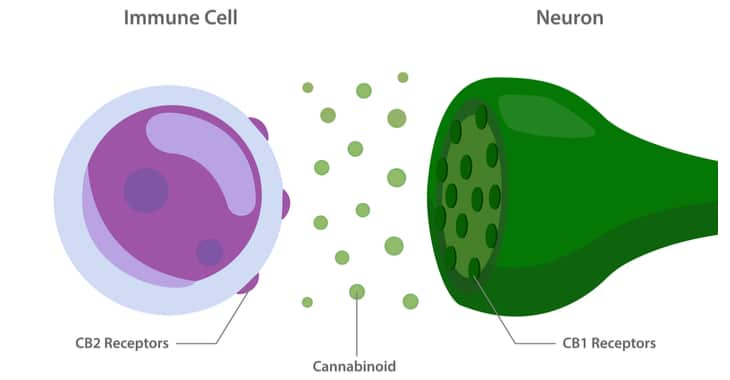
Research indicates that when someone consumes THC day in and day out, it produces excessive and prolonged stimulation of the CB1 receptor, which is believed to then disrupt endocannabinoid function6. It’s also been suggested that overstimulation of the CB1 receptor is something that could lead to THC-induced psychosis7.
If someone is a chronic cannabis consumer, could taking a break from THC actually help reset endocannabinoid function? Could consuming less THC help those who’ve thrown their endocannabinoid system out of whack by consuming too much and developing a high tolerance to THC?
Definitely a possibility. Tolerance can become so affected by chronic consumption that even taking a huge dab won’t even cause an effect in some of the heaviest smokers.
Research into the complexity of cannabis and how it works with the body is still in its infancy, however, is increasing exponentially with each passing year. Until then we have mostly a lot of anecdotal evidence to rely on.
The good news is that you can ask any heavy consumer what stopping for a week to 10 days does. They’re likely to tell you that taking a while off
5 Tips to Taking a Tolerance Break
Think it’s time for a break from cannabis? If you’re someone who could benefit from a break for whatever reason, we’ve compiled a few tips to get you through the time it takes to reset your endocannabinoid receptors so you can resume your love affair with Mary Jane.
First, Have an Open Mind
I think everyone who’s ever said they’re going to take a tolerance break knows about the whole mentality of “weed isn’t addictive, I can quit whenever I want” mentality…but when it comes down to actually doing it, they realize it’s harder than they might’ve expected.
Here’s the thing, though. Anything you do day in and day out is going to be difficult to stop doing. This goes for being glued to your cell phone 24/7, drinking coffee every day, eating, and all the other things you do on a daily basis. Our bodies and minds crave that which is familiar.
Keep this in mind during your break period. Even after a few days when that voice creeps in to remind you of how much better life is when you wake and bake…do your best not to listen.

Weed will still be there in the mornings when your tolerance break is over. Just make sure you go in knowing it might not be as easy. But it can be done. And you’re likely to thank yourself when it’s over. Talk about a whole new level of appreciation.
Slowly Cut Down Before Quitting
Heavy consumers may want to consider cutting down gradually before cutting out THC cold turkey. Pick a date you want to start your tolerance break and begin cutting down your consumption a couple of weeks beforehand. Cutting down gives your body and endocannabinoid system time to adjust and makes actually “quitting” for a bit a far easier process and reduces any possible withdrawal symptoms.
If you’re someone who likes to smoke in the morning, start to skip out on the weed first thing. Wait until mid-day, and over the course of a couple of weeks get to the point where you’re only taking a couple of hits before bed.
Trust us. We speak from experience. Slowly cutting down and giving your body time to adjust is MUCH easier than quitting all at once.
Remove Everything Weed Related From Your Home
When it comes time to actually stop consuming cannabis altogether, it’s vital to remove all your cannabis and everything associated with it either out of the house or out of view. The whole “out of sight, out of mind” thing is something to really keep in mind when you’re taking a break.
Consider moving everything into the garage or another room in your house. This includes any flower, concentrate, oil, papers, pipes, bongs, dab rigs, and the like. It’s pretty easy to stay tempted when you can see your favorite bong staring back at you.
Whether in your house, car, or wherever else you’re privy to stashing your stash…get rid of it. If you can’t trust yourself not to get it out of its hiding spot, give it to a friend to hold onto for you until your break over.
Keep the Mind Busy
If you’re a regular cannabis consumer, your first t-break can be strange. There’s suddenly such a different perspective of time. Sometimes you’ll feel this rush of energy that can make you feel like you don’t know what to do with yourself.
During your break, it’s important to stay busy. Take up a new hobby, organize that closet you keep putting off, engage in some arts and crafts, do whatever it is you’ve been thinking about doing but possibly put off because you were high all the time.
Not only will this keep your mind occupied, but can is also an awesome way to create new habits. When you do start consuming again, you can bring these new habits with you (because any regular consumer knows that weed makes doing something you love just that much better).
Commit Yourself 100%
While taking a break isn’t as easy as it might sound at first, staying committed to doing it can be more rewarding than you might think.
You will be tempted to resume consumption during the time you take a break. Do yourself a favor and don’t give in to these urges. Stay focused and understand that the discipline it takes to keep your commitment will have a significant impact on all areas of your life.
You’re not quitting cannabis for good. You’re just taking a break. When it’s over, you’ll realize just how worth it the break really was the first time you light up.
How Long Should a Tolerance Break Last?
When it comes to taking a t-break, everyone is different. Some might need just a few days to a week to reset the system. Our last tolerance break was just shy of two weeks. Chronic consumers who smoke all day, every day might want to consider taking a month off.
World renown podcaster and cannabis enthusiast, Joe Rogan and his friends do a “Sober October” every year. They take a month off weed and alcohol as a healthy reset.
You know your body better than anyone. The whole three weeks/21 days to form a habit is always a good rule of thumb to follow to get you started.
The Helpful CBD Tolerance Break?
What about taking CBD during your break? Can it help? Maybe. We still need more research on this and CBD in general but there’s plenty of anecdotal evidence on this one.
THC and CBD react differently in the endocannabinoid system. THC binds directly to the CB1 receptor in such an adept manner that this binding affinity has been referred to as a “lock and key” system. CBD, on the other hand, has zero binding affinity with CB1 or CB2 receptors.
Instead, the non-psychoactive cannabinoid uses indirect means for regulating the endocannabinoid system to bring a state of homeostasis back to the body. According to neuroscientist and endocannabinoid expert Dr. Ethan Russo, CBD is an “endocannabinoid modulator.”
This means that CBD helps regulate the endocannabinoid system and restore overall balance to the body and brain. That being said, CBD could have a significant impact on this system during this break.
While more research is warranted, CBD could be beneficial when taking a tolerance break. While limited, we do have some data which shows that CBD can be helpful for marijuana and other addictions such as tobacco and methamphetamines8, 9, 10.
Anecdotally speaking, we know that taking a few hits of a CBD pre-roll (see our guide to CBD cigarettes) here and there helped us immensely during a recent tolerance break.
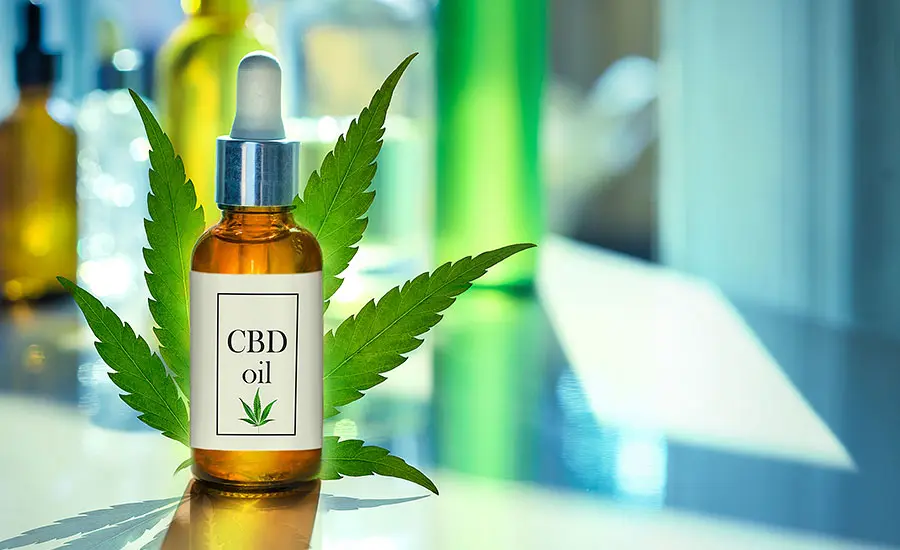
Incorporating CBD into your tolerance break could help with the lack of focus, anxiety, or poor sleep you might feel when taking a break from THC. Medical marijuana users find that CBD can be helpful as an alternative for some of the symptoms they were previously using THC for primarily.
Whether it’s vaping, smoking CBD flower, or taking a tincture, CBD could be of significant benefit during your break. At CBD School we are nerds for all the data we can get. Have you used CBD during a tolerance break from THC? Was it helpful? Please tell us about it in the comments section at the end of this article!
Final Thoughts on Taking a THC Tolerance Break
Think a tolerance break might be in order? If you’re not feeling the same effects from THC as you used to or have discovered you’re experiencing a bit of burnout, a tolerance break might be in order.
The endocannabinoid system can get overloaded from overconsumption of THC and stop functioning in the most ideal manner. Taking a break could reset the delicate balance of this system so tolerance levels resume and you’re once again feeling elevated.
CBD could help the whole process during a t-break by encouraging overall return to homeostasis for a system that’s otherwise out of balance. CBD can also provide relaxation or alleviation of symptoms. Whether your tolerance break lasts three days, a couple of weeks, or a month or more, one thing’s for certain.
When you return to consuming cannabis, you’ll have developed a whole new appreciation for the way it makes you feel. Have you taken a break from THC before? We’d love to hear your story in the comments below.
References
1Markgraf, C. G., MD, PhD. (n.d.). Introduction to Tolerance, Physical Dependence and Withdrawal. Lecture.
2Marco Colizzi, Sagnik Bhattacharyya, Cannabis use and the development of tolerance: a systematic review of human evidence, Neuroscience & Biobehavioral Reviews, Volume 93, 2018, Pages 1-25, ISSN 0149-7634,
https://doi.org/10.1016/j.neubiorev.2018.07.014.
3Kroon, E., Kuhns, L., Hoch, E., and Cousijn, J. (2020) Heavy cannabis use, dependence and the brain: a clinical perspective. Addiction, 115: 559– 572. https://doi.org/10.1111/add.14776.
4Budney, Alan J et al. “Marijuana dependence and its treatment.” Addiction science & clinical practice vol. 4,1 (2007): 4-16. doi:10.1151/ascp07414
5Ayano GJ. Dopamine: receptors, functions, synthesis, pathways, locations and mental disorders: review of literatures. J Ment Disord Treat. 2016 Aug 2;2(120):2.
6Bloomfield, M. A., Ashok, A. H., Volkow, N. D., & Howes, O. D. (2016). The effects of Δ9-tetrahydrocannabinol on the dopamine system. Nature, 539(7629), 369–377. https://doi.org/10.1038/nature20153
7Lynch, M., MD, Rabin, R. A., MSc, & George, T. P., MD, FRCPC. (2012, January 12). The Cannabis-Psychosis Link. Retrieved February 12, 2021, from https://www.psychiatrictimes.com/view/cannabis-psychosis-link
8Shannon, S., & Opila-Lehman, J. (2015). Cannabidiol Oil for Decreasing Addictive Use of Marijuana: A Case Report. Integrative medicine (Encinitas, Calif.), 14(6), 31–35.
9Gonzalez-Cuevas G, Martin-Fardon R, Kerr TM, Stouffer DG, Parsons LH, Hammell DC, Banks SL, Stinchcomb AL, Weiss F. Unique treatment potential of cannabidiol for the prevention of relapse to drug use: preclinical proof of principle. Neuropsychopharmacology. 2018 Sep;43(10):2036-2045. doi: 10.1038/s41386-018-0050-8. Epub 2018 Mar 22. PMID: 29686308; PMCID: PMC6098033.
10Prud’homme M, Cata R, Jutras-Aswad D. Cannabidiol as an Intervention for Addictive Behaviors: A Systematic Review of the Evidence. Subst Abuse. 2015 May 21;9:33-8. doi: 10.4137/SART.S25081. PMID: 26056464; PMCID: PMC4444130.
